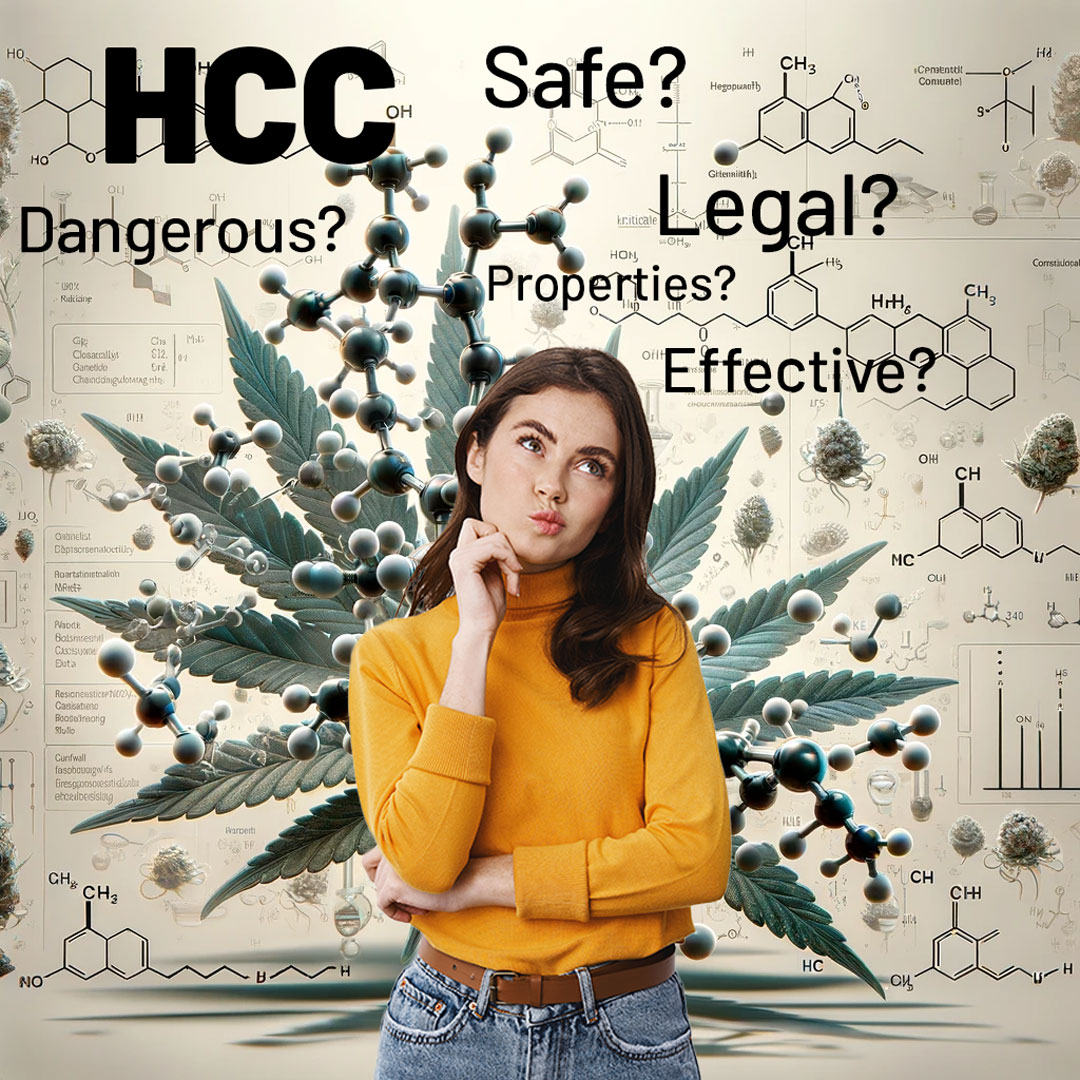HHC vs Delta-9 THC: the psychoactive puzzle

HHC (Hexahydrocannabinol) is a psychoactive material with effects allegedly similar to those of THC. HHC vaporisers have been sold openly in parts of North America & Europe (especially Czechia and Germany). HHC can be made synthetically and inexpensively from Citronellal (one of the constituents of Citronella oil) and Olivetol.
Both of these raw materials are easy to buy making HHC a relatively straightforward product to lab-synthesise. As well as HHC vaporisers, HHC hash, HHC gummies/edibles and HHC weed are also available, made/sprayed with synthetic HHC.
Many in the cannabis community are disturbed by news of HHC cannabis, some are horrified and worried about safety. One other concern for any ‘spice’-style psychoactive lab-made compounds is the possibility of unintended toxic by-products from the production process. Especially if the HHC was made in back-street labs.
What is Hexahydrocannabinol (HHC)?
HHC is rarely seen in weed grown from feminised seeds or autoflowering cannabis seeds. One of the more recent high-quality studies into naturally occurring HHC was done in Barcelona in 2020, published by de Las Heras & Basas Jaumandreu. This showed 43 cannabinoids from a single sativa strain. HHC was present in trace quantities and, perhaps more surprisingly, 16 ‘new’ cannabinoids were found for the first time.
One suggestion, published by Carlton Turner & colleagues tentatively suggests that HHC found in seed-grown cannabis is present in trace quantities due to it being a minor by-product of THC degradation (CBN being one of the more common decomposition products of THC).
Why the interest in Hexahydrocannabinol (HHC)?
In some USA states, Hexahydrocannabinol (HHC) may be legal thanks to the 2018 farm bill. In other regions HHC legality may be uncertain and may fall into the ‘grey zone’ between being legal and illegal.
In the UK (and some EU states) HHC falls foul of the justice system thanks to laws such as the UK’s 2016 Psychoactive Substances Act, which seeks to ban any compounds or products that have a psychoactive effect. In France, in June 2023 the ANSM (Agence nationale de sécurité du médicament) banned the production, sale and use of HHC or any related compounds. Other European countries such as Sweden, Belgium, Italy, Denmark, Lithuania and Slovenia recently banned HHC. Germany is expected to follow suit in early 2024.
The main commercial/financial interest for synthetic HHC producers are those regions that still allow HHC products to be used. That said, it is unlikely to take too long before the authorities crack down on HHC legal loopholes, especially if neighbouring countries have done the same.
HHC cannabis flowers properties

Those that can remember the problems with spice-style products sprayed with artificial psychoactive substances have already seen the risks and dangers. Most cannabis users would rather use safe, natural weed grown from cannabis seeds rather than take their chances on an artificial synthetic version.
What are the alleged effects of HHC?
Early feedback indicates that HHC produces effects similar to THC at broadly similar concentration levels. However, these effects are currently unconfirmed by formal medical studies.
HHC vs THC: Does HHC get you high?
Yes, HHC provides a psychoactive high though elevated levels (20-30%) may be required. But more people would like to see professional studies to better characterise these effects and investigate safety and medical considerations.
Is HHC safe to use?
Safety of new cannabinoids is often the top question for those keen to explore. So far, most cannabis lovers will be aware that there have been no dangerous natural cannabinoids or terpenes found in the cannabis plant over its many thousand years of use.
Some may feel optimistic, and possibly even excited by the prospect of a major new HHC psychoactive cannabinoid. Others will feel a profound sense of discomfort that the only current way to create HHC-rich buds/concentrates/edibles is by the process of infusing with synthetic HHC. Given the rate at which the national authorities are banning HHC it seems that it will have only a brief window of opportunity in legal markets.
Are HHC cannabis flowers and other products legal?

HHC products are coming under understandable judicial scrutiny and many Governments have already banned HHC or are moving quickly towards that. The main concerns are health & safety issues. The spice (synthetic ‘cannabis’) epidemic from recent years has heightened awareness of synthetic psychoactive compounds and has served to strengthen Government resolve to avoid a repeat situation with HHC.
Key reasons why the HHC hype is so controversial
Few cannabis lovers have any serious interest in HHC, other than doing their best to avoid it. There are several key concerns:
• Current information on HHC is limited. During these times it can be tricky to separate reality from the product-hype being pushed by early vendors.
• Most are worried about safety/long term toxicity of high-HHC products and feel reassured by the fact that HHC is being banned.
• Many are concerned about any type of ‘cannabis’ product that has to be artificially infused with psychoactive ingredients. Does the infusion process unintentionally add any toxic or dangerous ingredients to the cannabis products?
• Is HHC itself safe at the very high levels used in e.g. HHC vape pens? Consuming trace, occasional quantities of natural HHC in weed is very much different to consuming HHC hash with 30% HHC. What are the health risks of HHC in large concentrations?
Do Dutch Passion cannabis seeds produce HHC?
Some cannabis strains show trace levels of HHC. But so far there are no strains that can consistently produce anything above trace levels. It is quite possible that HHC is merely a very minor decomposition product of THC rather than a cannabinoid which has major bio-chemical pathways leading to its direct production in large concentrations.
It should be added that Dutch Passion have been one of (if not the) most serious cannabis seed company when it comes to creating brand-new cannabis strains rich in unusual/rare cannabinoids. In recent years the Dutch Passion geneticists were the first to release stable commercial cannabis seeds which produce plants rich in CBG (cannabigerol), THCV (Tetrahydrocannabivarin) as well as CBD-rich cannabis seeds.
The full collection of Dutch Passion strains rich in unusual cannabinoids can be found in the Special Cannabinoid cannabis seed collection. Dutch Passion embrace new cannabinoid research, but the obvious concerns around synthetic HHC cause extreme concern.
HHC rich cannabis products are still new, with numerous concerns. They may only have a short period of time before they are banned in many more key potential markets.




























